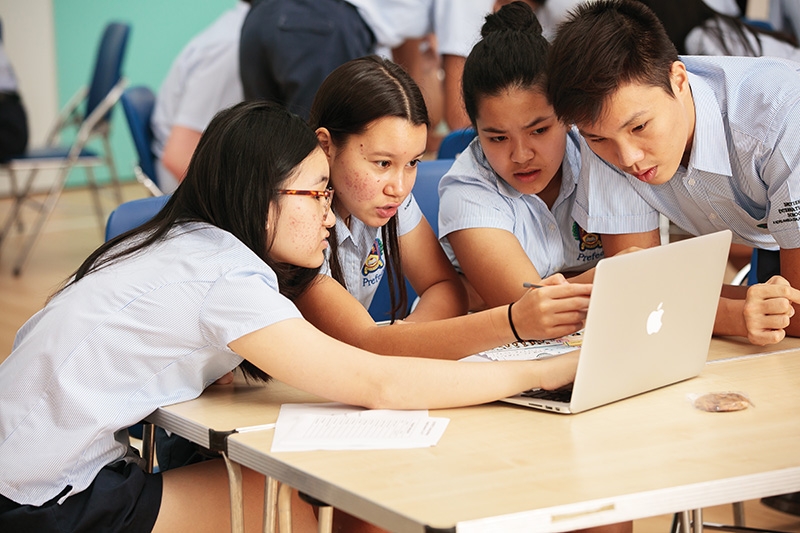Education’s essential digital revamp
 |
| Educators want to offer an streamlined and secure learning experience |
The application of digital technology in Vietnamese education became more and more practical as the pandemic took hold, with universities and schools quickly shifting to platforms like UPM and Zoom to offer an uninterrupted and secure learning experience.
A recent PISA study shows that online learning in Vietnam during the pandemic has been many comparatively positive with nearly 80 per cent of students studying online, higher than the global average of 67.5 per cent. After a little more than four months, nearly 50 per cent of universities in Vietnam have organised online teaching. In vulnerable areas, many teachers have been recording their lessons and posting them on YouTube, Zalo, Facebook, and similar platforms to create learning opportunities for students who cannot visit a classroom.
Talking at a conference on digital transformation of the education system throughout ASEAN, UNICEF representative in Vietnam Rana Flowers said, “The move online brought a renewed urgency for digital learning, underscoring the country’s stark digital divide. School reopenings served as a lightning rod to double down on efforts to reimagine education and to transform the system to ensure all children and young people in the country have access to digital learning and are prepared for an increasingly connected world and knowledge-driven economy.”
The Ministry of Education and Training (MoET) agreed that the regulations governing online teaching at high school level create a legal corridor for online teaching to be recognised as a supplementary method for direct teaching and the results will be issued by the MoET in the near future.
Today, more than 7,000 e-learning lectures and nearly 200 textbooks have been digitalised and shared on the internet. The MoET also successfully digitalised the profiles of 23 million students and 1.4 million teachers in 53,000 schools across the country, helping with the planning, evaluating, and forecasting of more effective educational activities.
Minister of Education and Training Phung Xuan Nha said that the ministry is also building a digital capacity framework for students from kindergarten to high school. As such, IT skills are being taught from elementary level, focusing on digital skills, IT application, and computer science, including the emerging topics of the Fourth Industrial Revolution like AI, big data, and robotics.
Meanwhile, science, technology, engineering, and mathematics are also promoted through the development of innovation centres in schools. The curricula are not limited to the transmission of knowledge but focus on the learners’ ability to understand, think digitally, and master technology.
“To prepare for the new educational programme to be launched from this school year, teachers nationwide have been continuously trained online based on learning management systems,” said Minister Nha.
Nguyen Manh Hung, Minister of Information and Communications, said as technology and life change rapidly, learning is a lifelong endeavour, as is retraining and advanced training. Vietnam has the advantage of many strong digital technology businesses that can develop digital platforms to support education.
“The MoET should lay out directions, and the Ministry of Information and Communications will direct businesses in the industry to further evolve current educational platforms,” said Hung.
He also suggested that the MoET considers changing some regulations to formalise sharing of online learning in national education – for example, requiring 15-30 per cent of learning to happen online even after the pandemic is over, as these methods will quickly boost digital skills of both teachers and students, as well as narrow the digital transformation gap in education between cities and the countryside.
Minister Hung added that the two ministries will hold a seminar on digital transformation in the education sector to take advantage of the opportunities that were presented during the health crisis so as to accelerate digital transformation.
What the stars mean:
★ Poor ★ ★ Promising ★★★ Good ★★★★ Very good ★★★★★ Exceptional
Themes: Human Capital 4.0
Related Contents
Latest News
More News
- A golden time to shine within ASEAN (February 19, 2026 | 20:22)
- Vietnam’s pivotal year for advancing sustainability (February 19, 2026 | 08:44)
- Strengthening the core role of industry and trade (February 19, 2026 | 08:35)
- Future orientations for healthcare improvements (February 19, 2026 | 08:29)
- Infrastructure orientations suitable for a new chapter (February 19, 2026 | 08:15)
- Innovation breakthroughs that can elevate the nation (February 19, 2026 | 08:08)
- ABB Robotics hosts SOMA Value Provider Conference in Vietnam (February 19, 2026 | 08:00)
- Entire financial sector steps firmly into a new spring (February 17, 2026 | 13:40)
- Digital security fundamental for better and faster decision-making (February 13, 2026 | 10:50)
- Aircraft makers urge out-the-box thinking (February 13, 2026 | 10:39)

 Tag:
Tag:















 Mobile Version
Mobile Version